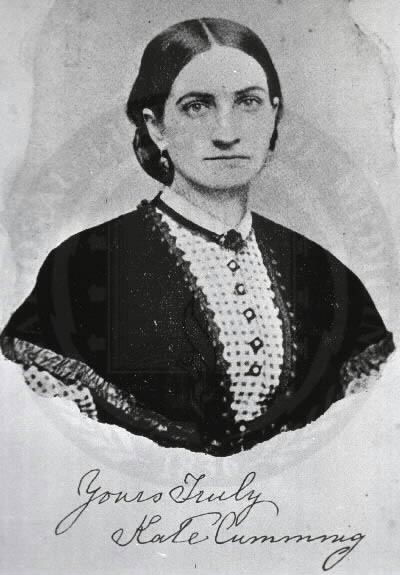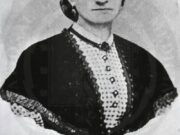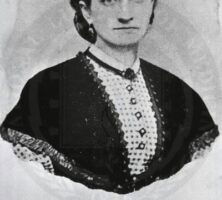Kate Cumming is best known for her dedicated service to sick and wounded Confederate soldiers. She spent much of the latter half of the Civil War (1861-65) as a nurse in hospitals throughout Georgia.
Born in Edinburgh, Scotland, circa 1830 (sources differ on the exact date), Cumming migrated with her family to North America as a young child, stopping first in Montreal, Canada, before permanently settling in Mobile, Alabama. Inspired by both the Reverend Benjamin M. Miller, who in an address urged the women of Mobile in early 1862 to aid wounded and sick Confederates, and by Florence Nightingale, the heroic British nurse who served in the Crimean War, Cumming, despite having no formal nursing training, decided to offer her services. Much to the distress of her parents, who firmly believed that ladies did not belong at the battlefield, she left Mobile in April 1862, along with forty other local women, including the novelist Augusta Jane Evans Wilson (although Wilson did not make it to the front), for the Mississippi-Tennessee border. There, until June 1862, she cared for Confederate soldiers injured at the Battle of Shiloh (April 1862).

Courtesy of National Library of Medicine
Unlike most women nurses, who served only temporarily, Cumming continued as an active nurse for the duration of the war. After a two-month respite in Mobile during the summer of 1862, she traveled to Chattanooga, Tennessee, to volunteer at Newsome Hospital, where she remained for the next year. While there, the Confederate government reluctantly decreed in September 1862 that hospitals could legally pay nurses rather than rely on them as volunteers. Thus Cumming’s status changed from volunteer to professional; for the war’s duration, she was officially enlisted in the Confederate Army Medical Department.
After the fall of Chattanooga in the summer of 1863, Cumming moved on to Georgia, where she served in numerous mobile field hospitals established throughout the state in response to the destruction inflicted by Union general William T. Sherman’s troops. As the major military forces moved southward and eastward, so did the location of these facilities. Confederate field hospitals were set up in many Georgia locations, including Catoosa Springs, Cherokee Springs, Dalton, Kingston, Marietta, Ringgold, Rome, and Tunnel Hill, during the Atlanta campaign of 1864. Later they were established in other Georgia locales: Americus, Athens, Augusta, Barnesville, Columbus, Covington, Forsyth, Fort Gaines, Greensboro, Griffin, LaGrange, Macon, Madison, Milner, Newnan, Oxford, Thomaston, and Vineville. Though not employed in all these hospitals, Cumming spent considerable time in several of them, specifically those at Americus, Cherokee Springs, Dalton, Newnan, and Ringgold. When the war ended in April 1865, she was working in southwest Georgia.
Cumming returned to Mobile after the war, and in 1866 she published A Journal of Hospital Life in the Confederate Army of Tennessee from the Battle of Shiloh to the End of the War, a chronicle of her day-to-day nursing experiences on the Civil War battlefields of Tennessee and Georgia. In 1874 she moved with her father to Birmingham, Alabama. She never married. She resided there as a teacher and active member of the United Daughters of the Confederacy until her death on June 5, 1909. She is buried in Mobile.





